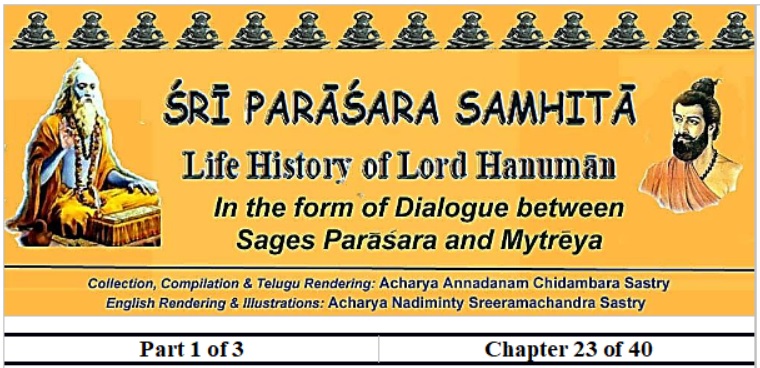
23rd Chapter (Triōvimśatitamah Paţalah)
“The Story of the History of Hariśarma”
(Hariśarmacaritra Kathanamm)
श्रीपराशर:
पुनर्वक्ष्यामि मैत्रेय-हनुमद्भक्तसत्कथाम्
त्रूणुष्वावहितो ब्रह्मन् मनो मे सुप्रसीदति।। 1
Parāśara:
“Oh! Sage Mytrēya. I am telling another good story of a worshipper of Hanumān. Listen with attention. Somehow my heart feels like narrating the same. (1)
पुण्ये गोदावरीतीरे महामुनिनिषेविते
ब्राह्मणो हरिशर्मेति न्यवसत्कुशतर्पणे।। 2
Harśarma
In a village named Kuśatrapaņam located on the bank of holy River Gōdāvari that is worshipped by great personalities, lived a Brāhmin named Harśarma. (2)
वेदवेदांगसारज्ञो दृढ़भक्तो हनूमति
तस्य मन्त्रार्चनध्याननामकीर्तनतत्पर:।। 3
He studied the Vēdas and all theirs parts Vēdańgas and has steady devotion towards Lord Hanumān, He observed all the mantra practices of Hanumān and was deeply engorsed in His reverence (arcana), meditation, and invocational singing. (3)
सत्यवादी तपोनिष्ठो विशुद्धात्मा जितेन्द्रिय:
गुरौ च हनुमद्क्तेष्वन्यविद्वत्सु सत्सु च।। 4
(He is a) Stickler to truth, engorsed in sacrifices (tapōnişta), with a sinless soul, having comtrol over his senses; and respectful to teachers, Hanumān devotees, fellow scholars and virtuous individuals, (4)
विनीतस्सत्यसम्पन्न्: सर्वभूतहिते रत:
करोति हनुमत्प्रीत्यै श्रौतस्मार्तादिका: क्रिया:।। 5
Having great devotion, rich in truthfulness, desirous of the well-being of all living beings and performer of all the actions mandated as per the Vedas and scriptures on righteousness. (5)
एकदा चिन्तयामास स तु तीर्थपरायण:।। 6
Pilgrimage
Once, desirous of performing pilgrimages, he started thinking so. (6)
अहं संसारजलधौ निर्मग्नो दुरितालये
बध्वा भार्यां सुतान्कण्ठे तरितुं नैव शक्तवान्।। 7
‘I am immersed in the sea full of mundane sinful things. I am unable to cross this world burdened by the responsibility of wife and children. ()Then again would think) (7)
किमियं मम दुर्बुद्धि: हनुमन्नाम्नि संस्थिते
पारं गंतुमशक्तस्सन् कार्पण्यं परमं गत:।। 8
Oh! How come I with such devilish thoughts? When Lord Hanumān is there, how did I became powerless to cross this sea? (8)
तस्य प्रसादतस्सर्वपुण्यक्षेत्राणि पर्यटन्
सर्वपापविनिर्मुक्तो गच्छामि परमांगतिम्।। 9
By his grace, I will visit all the pilgrim centres, get rid of all my sins and reach an exalted position’. (9)
एवं निश्चित्य विप्रेन्द्रो निर्गत्य स्वगृहात्तदा
श्रीशैलमार्गतो गच्छन् आससाद महानदीम्।। 10
Deciding so, Hariśarma left home immediately and going along the path to Śriśailam, reached a great river. (10)
कृष्णवेणीं महाभागां कृष्णदेहसमुद्भवाम्
तत्र स्नात्वा च पीत्वा च तर्पयित्वा पितृनथ।। 11
Reaching that great River Krişņa, that is born from the body of Lord Krişņa and full of pure water, performing bath and other rituals there, having performed water obeisance to ancestors, (11)
निवासं पार्वतीजाने: संप्राप्त: श्रीगिरिं द्विज:
तत्र गत्वा महादेवं देवदेवं वृषध्वजम्।। 12
That Brāhmin reached Śriśailam, the abode of Lord Paramēśwara, the spouse of Pārvati. (12)
प्रणम्याराधनं चक्रे भवानीसहितं शिवम्
ततो गच्छन्स विप्रेन्द्रो गरुड़ाद्रिदिदृक्षया।। 13
Reaching there, he worshipped Śiva, the lord of lords (dēvadēva), great lord (mahādēva), the one who has the great bull (vŗşabha) as his flagpost. Afterwards, as that Brāhmin was walking, intent on seeing Garudādri (Eagle Mountain), (13)
आससाद महापुण्यं श्रीमाच्रिमदहोबिलम्
तत्र लक्ष्मीसमायुक्तं नृसिंहं करुणालयम्।। 14
That auspicious one reached the pilgrim center Ahōbala renowned for giving virtuous merit (puņya). There – accompanied by his consort goddess Lakşmi, the most compassionate, form of Narasimha (Man-Lion), (14)
त्रैकोक्यनाथं देवेशं पह्लादप्रणवं हरिम्
श्रीभूमिसहितं देवं श्रीनिकेतं नरंहरिम्।। 15
Lord of the Three Worlds, leader of all the gods, receiver of Prahlāda’s (an ardent child devotee), Viśņu, replendent with his two consorts Bhoodēvi (Goddess Earth) and Śrīdēvi (Goddess Wealth), the Supreme Lord, abode of wealth (Lakşmi), half lion and half man, (15)
हिरण्यकशिपुघ्नं तं भक्ताभीष्टवरप्रदम्
भक्तिपूर्वं नमस्कृत्य स्तोत्रैस्तुष्टाव चक्रिणम्।। 16
Killer of demon Hiraņyakaśipu, giver of desired boons to devotees, the one wearing the disc weapon (cakra) – he bowed with folded hands and worshipped with great devotion. (16)
सर:स्थानानि पुण्यानि समाराध्य महामति:
तर्पयित्वा पित्रूस्तंत्र वेड्क्तख्यगिरिंगत:।। 17
He, the clever one worshipped at virtuous-merit-giving (puņya) pilgrim centres, presented water obeisance there to the ancestors, on way to Vrnkatāchala (mountain abode of Lord Venkatēśwara, Bālāji). (17)
मार्गे चण्डांशुकिरणै: तप्तदेह: क्षुधातुर:
तृष्णापरीतस्तन्मार्गे मूर्छितो न्यपतद् भुवि।। 18
Hanumān’s Kindness
On the way, due to instense heat of Sun, he suffered heat exhaustion and thirst, as a result of which he fainted and fell on the ground. (18)
हनुमान्भक्तवात्सल्यात् दृष्ट्वा विप्रं कृतश्रमम्
आगत्य शूद्ररूपेण तमुवाच दयाकुल:।। 19
Out of great mercy towards devotees, Hanumān saw the prostrate Brahmin, came there in the garb of a coomom working person and with plenty of sympathy said so. (19)
उत्तिष्ठ विप्र किंशेषे भूमावातपतापित:
किमर्थमागत: किंवा तथागमनकारणम्।। 20
‘Oh! Best among Brahmins! Get up. Exhausted by the heat of the Sun you fell on these lands of Śēşagiri mountain. Desirous of what gain, you came here? What is the reson for your coming? (20)
इत्युक्त: प्राहतं शूद्रं वेड्कटेशदिदृक्षया
समागत: क्षुधार्तो हं मूर्छितो विजने पथि।। 21
So asked, Hariśarma told so to that man. ‘I came to have come to see Lord Venkatēśwara. Having come, I fainted and fell down in this uminhabited place due to hunger. (21)
उवाचासौ ममाभ्यासे पेटिकायां महागुणम्
वर्तते प्रदास्यामि भुक्त्वा तृप्तिमवाप्स्यसि।। 22
Then that working class man said so. ‘I have cooked rice in my box. I offer it to you. Eat and be satisfied’. (22)
उवाच त्वं शूद्रवर्ण: कथमश्नाम्यहं द्विज:
सुपक्वानि फलानि त्वं देहि कारुण्यमस्ति चेत्।। 23
To that Hariśarma said, ‘You are an ordinary non-Brahmin and I am a Brahmin. Hence, how can I eat so? If you have mercy for me, please give me some ripe fruits’. (23)
इत्युक्तस्य ददौ पक्व फलानि विविधानि च
रंभाम्रबदरीजंबूकपित्थपनसानि च।। 24
So told, that man collected different ripe fruits like banana, mango, country plum, hog plum, jack fruit, (24)
आनीयामृतकल्पानि सुगन्धीनि द्विजातये
भक्षयित्वद्विजस्तृप्तिमवाप्य विगतश्रम:।। 25
That are sweet like heavenly nectar (amŗta) and emanating fine fragrance, were brought and given to the Brahmin. Having eaten them, satisfied, (25)
तेन संभाषितुं बुद्ध्या समन्तादवलोकयन्
न ददर्श द्विजश्शूद्रं विस्मयं परमं गत:।। 26
He looked around for that ordinary person for talking and thanking; but was very surprised at not finding him. (26)
किमाश्चर्यमिदं शूद्रो मह्मं दत्वा फलानि च
क्षणेनां तर्दधे को यं हनूमान्वा भविष्यति।। 27
‘What a surprise? That man gave me fruits and just disappeared. Who is he? Could he be Lord Hanumān Himself? (27)
बाल्यात्प्रभृत्यर्चयतो जपत: स्तुवतस्सदा
स्वरूपं द्रष्टुकामस्य हनूमान् वानरोत्तम:।। 28
Hanumān is the greatest among the monkey warriors, whom I have been serving since childhood, meditating upon, singing invocational songs for, and whose form I was wishing to see. (28)
कदाचिदपि मे प्रीतो नहि प्रत्यक्षतांगत:
पापीयसो मे दौर्भाग्यं महदस्ति न संशय: ।। 29
Never was he satisfied with me and gave visison of his divine form (pratyakşa). Definitely the sinful me is full of bad luck. (29)
महापदं वा गच्छामि प्रवेक्ष्यामि हुताशनम्
वदन्ति वेदतत्त्वज्ञा: दैवमस्तीति सर्वदा।। 30
I will face great dangers or I will enter into fire. Scholars of Vēdas always tell that there is God. (30)
संशयो मे महानत्र मिथ्येव प्रतिभाति मे
इतिचिंतापरेविप्रे हनूमान्कृपया न्वित:।। 31
Now I am having doubts about it. That seems to be untrue’. Seeing the Brahmin grieving in this manner, merciful Hanumān. (31)
स्वरूपं दर्शयामास देवानामपि दुलर्भम् 32
Presented His divine form to him, which is not possible even for godly beings to obtain. (32)
कण्ठे हारंश्रवणपुटयो: कुण्डले स्कन्धदेशे
ब्राह्म्ं सूत्रं करकलयो: कंकणान्यंचितानि
मध्येपीतं कनकवसनं चोध्र्वपुण्ड्रं ललाटे
वामे देवीं मिहिरतनयां बिभ्रतं वानरेन्द्रम्।। 33
Hanumān the lord of monkeys (kapīndra) with wonderful chains around the neck, earring on the ears, sacred thred over the shoulder, beautiful bracelets on the wrists, draped around the loin with yellowish golden cloth, a brilliant verticl mark on His forehead and Sun’s daughter Suvarcchala to his left side, (33)
विलोक्य विस्मितो भूत्वा प्रणम्य शिरसा हरिम्
स्तोत्रैश्च विविधैर्नत्वा प्रदक्षिणापुरस्सरम्।। 34
Surprised to see such a form, he paid obeisance to the lord of monkeys with bowed head, praying with different praising hymns (stōtra), folding hands and taking due rounds around (pradakşiņa) Him, (34)
ननाम शिरसा भूयो हरिशर्मांजनासुतम्
बाल्यात्प्रभृति ते रूपं द्रष्टुकामो हमीश्वरम्।। 35
Hariśarma bowed to Hanumān several times and said so. ‘I was desirous of seeing your divine form from my childhood. (35)
भवान्कदाचिदपि मे न चक्षुर्विषयं गत:
इति दु:खाकुलस्यासी: भवान्लोचनगोचर:।। 36
You have kindly appeared before my eves, while I was always grieving for your divine vision. (36)
धन्यो हं कृतकृत्यो हं नास्ति मत्सदृशो भुवि
इत्युक्त: प्राह हनुमान् ना हं वर्ते त्वया विना।। 37
I am blessed. I succeeded. There is no one on this Earth as lucky as myself’. Then Hanumān said, ‘Dear one! I am not separate from you. (37)
निगूढरूपस्सततं त्वयि भक्तिपरायणे
मम भक्त इति ब्रह्मन् इदानीं शूद्ररूपिणा। 38
Oh! Devotee personified! Though you are not able to see me, I was always with you. Even now, Oh! Brahmin! Because you are my devotee, I took the garb of an ordinary non-Brahmin, (and) (38)
फलैरमृतपिंडाभै: भवान्संतर्पितो मया
वरं वरय भद्रं ते प्रसन्नो हं तवानघ।। 39
I gave you fruits that are sweet as the heavenly nectar contentedly. I am pleased with you. Seek good boons that you are desirous of’. (39)
इत्युक्त: प्राह विप्रेद्र: तव पादाब्जभक्तित:
त्वद्भक्तक्त्जनवात्सल्यात् नान्यमिच्छाम्यहं वरम् 40
Hariśarma’s Wish fulfilled
Hearing that Hariśarma said, ‘Oh! Great soul! Because of Your benevolence to devotees, I seek nothing but staunch devotion to your lotus feet’. (40)
इति श्रुत्वा वदद्विप्रं हनुमान्भक्तवत्सल:
भुक्तिं मक्तिं प्रदास्यामीत्युक्त्वैवांतरधीयत्।। 41
Hearing that, Hanumān, the most merciful to devotees, told the Brāhmin, ’I am granting all comforts of this world, as well as ultimate liberation from it’, and divinely disappeared (antardhāna). (41)
हरिशर्मा पि संतुष्ट: प्रभावं श्रीहनुमत:
स्मरन्वेंकटशैलस्थं वेंकटेशमुदीक्षितुम्।। 42
Hariśarma, happily reminiscing at the powers of Lord Hanumān, so as to have the divine vision of Lord Venkatēśwara, (42)
गत्वा कुमारसरसीं संप्राप्त: पापनाशनम्
तत्र स्नात्वा च पीत्वा च संतप्र्य च पितृनथ।। 43
Having reached (at Tirumala Hills) the Papanāśanam stream and Kumāra Lake, took bath, offered water obeisences to ancestors, then (43)
श्रीवैकुंठं परित्यज लक्ष्म्या सह मुदा युतम्
आनंदनिलयांतस्थं नारायणमुदैक्षत।। 44
Had the divine vision of Śreemannārāyaņa (Venkatēśwara) that left back consort Lakşhmi in the heaven (vaikuntha) and put up there happily. (44)
प्रणम्य शिरसा भूय: प्रदक्षिणपुरस्सरम्
नानाविधै:स्तोत्रजालै: स्तुत्वा मुदमवाप स:।। 45
There he felt blissful after performing ‘going rounds’ (pradakşiņa) with folded hands (namskaras) accompanied by head bows (sirasa) with singing praising songs simultaneously. (45)
प्रसादान्नं समासाद्य मधुरं पावनंहरे:
सर्वपापविनिर्मुक्तो बभूव विगतज्वर:।। 46
He could get rid of the ill effects of sins by partaking the sweet and holy consecrated rice (prasāda) offered to Lord Vişņu (Venkatēśwara). (46)
समस्ततरुमंडितं सकलपुष्पसंवासितम्
सहस्रगिरिनिर्झरं सकलसिंहशावाकरम्
विशालसरसीयुतं विविधविद्वदाराधितम्
सरोजवनवासिनीनखविलाससचारितम्।। 47
Radiant with all varieties of flowering trees and shrubs, anointed with all varieties of flowers, blessed with thousands of lakes, praised by many a scholar, with many lion kids going around, with vast water bodies, mesmerizing with the dancing movements of the nails of forest dweller women plucking the flowers, (47)
शेषाचलं समालोक्य वैकुंठेच्छां परित्यजन्
उवास कतिचिन्मासान् मुकुंदाराधनेच्छया।। 48
Seeing such Śēşācala forests, foregoing the wish to go to the heaven satyed there for some months worshipping Lord Vişņu. (48)
ततो वरदराजं तु शिवकांच्यां विलोक्य च
श्रीरंगदिव्यभवनं द्रष्टुकामो ययौ द्विज:।। 49
Afterwards that Brāhmin went and had the holy vision (darşan) of Lord Varadarāja (king of bestowal; brother of Vişņu) went to (Śrŗrangam). (49)
तत्र चोभयकावेरीमध्ये श्रीरंगमंदिरे
स्वयं व्यक्तजगन्नाथं भुजंगशयमीश्वरम्।। 50
In the Śrŗrangam temple located between the two Kāvēri Rivers, self-appearing (swayambhu) Lord Jagannātha, the Supreme Beeing, one with the great first serpent (ādiśeşa) as bed, (50)
लक्ष्मीभूमिसमायुक्तं युक्तं परमयोगिभि:
चंद्रपुष्करिणीतीरे विराजंतं श्रिय: पतिम्।। 51
Together with consorts Lakşhmi (wealth) and Bhoodēvi (Earth), surrounded by the greatest of Yōgis, resident of the Chandra-lake (candrapuşkariņi) pilgrim centre, resplendent Lakşhmpati (consort of Lakşhmi; Vişņu), (51)
दृष्ट्वा स्तुत्वा स्तवैर्भूयो मुदा परमया युत:
तत्र स्नात्वा च पीत्वा च संतप्र्य च पितृनथ।। 52
Having seen, worshipped by recisitng many invocations, obtained great bliss there, took ritualistic bath, performed water obesence to ancesgtors and then, (52)
महापापहरं सेतुं दृष्ट्वा तीर्थं हनूमत:
तस्य तीरे हनूमंतं विलोक्य तमपूजयत्।। 53
Reached Hanumatīirtha (a place of Hanumān pilgrimage), saw the sin-removing bridge (sētu), saw Lord Hanumān on the bank and wordhipped Him well. (53)
ततो रामेश्वरं देवं अर्चयामास स द्विज:
तस्माद्देशात्समद्धार्थ: पुनस्स्वगृहमागत:
भुक्त्वा भोगान्स र्धर्मात्मा काले मुक्तिमवाप ह।। 54
Then Hariśarma worshipped Lord Ramēśwara (Śiva set up by Lord Rēma at Ramēśwaram). He earned a lot of wealth in that region and, having returned to his home again, that virtuous person enjoyed all good things and ultimately attained liberation. (54)
इति श्रीपराशरसंहितायां श्रीपराशरमैत्रेयसंवादे हरिशर्मचरित्रकथनं नाम त्रयोविंशतितम: पटल:
Thus ends the 23rd Chapter, entitled “The Story of the History of Hariśarma” (Hariaśarmacaritra kathanamm) of Śrī Parāśara Samhitā
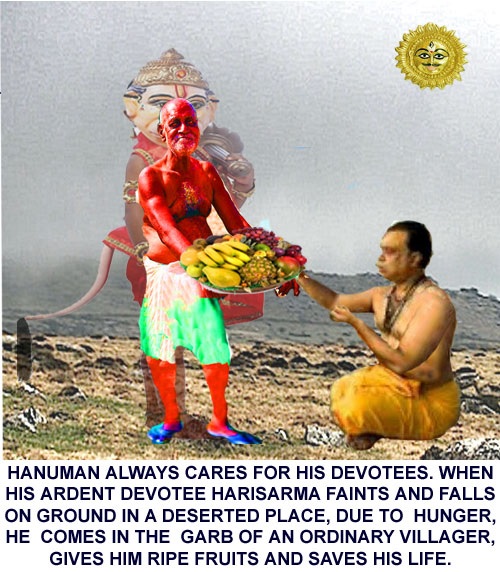
![]()

Click here to visit the Contents of the Part 1.
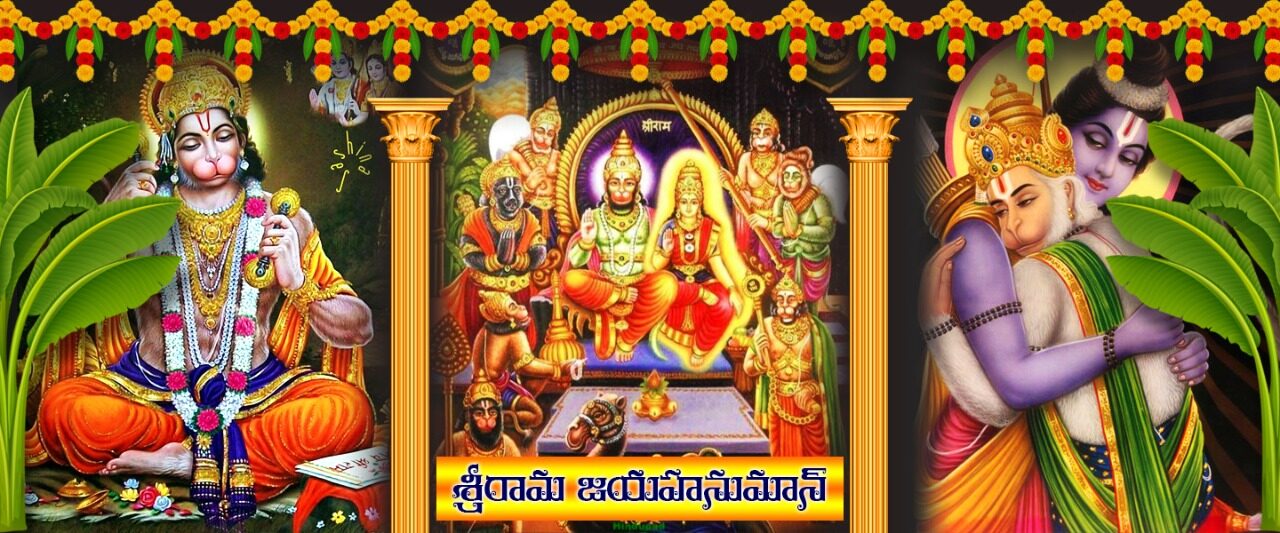


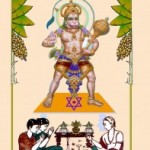
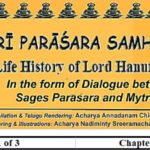

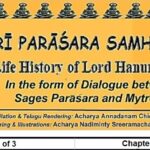
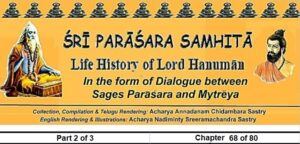
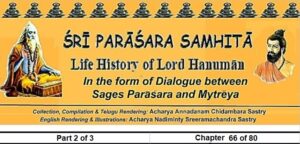
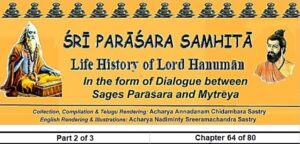
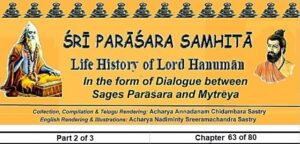
Be First to Comment